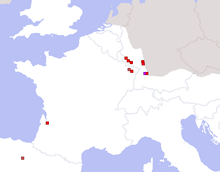- Visucius
-
Visucius, seltener (irrtümlich?) Visuclus, war in der keltischen Mythologie eine gallische Gottheit, die nach der Interpretatio Romana dreimal mit Mercurius gleichgesetzt wird.
Inhaltsverzeichnis
Mythologie und Etymologie
Der Name Visucius ist in insgesamt sieben Inschriften erhalten. Eine in Bordeaux,[1] drei wurden in den ehemaligen Stammesgebieten der Treverer und Mediomatriker in der römischen Provinz Gallia Belgica[2] sowie drei weitere in der Provinz Germania superior[3] vorgefunden.
Eine in Agoncillo (Spanien) entdeckte Weihetafel für Visugius bzw. in neuerer Lesung Visuceus könnte der selben Gottheit gewidmet sein.[4]
Der Name wird aus den erschlossenen proto-indogermanischen Wurzeln *wesu-/*wīsu-? („gut“), *ki- („dieser“) und der lateinischen Endung -us abgeleitet, bedeutet also „dieser gute Gott“. Eine andere Version leitet ihn von der Wurzel *weiko- („Rabe“) oder *witsu- („wissend“) her, dies würde „der Rabengott“ oder „der weise, wissende Gott“ ergeben.
Siehe auch
Literatur
- Johann Baptist Keune: Visucius. In: Wilhelm Heinrich Roscher: Ausführliches Lexikon der griechischen und römischen Mythologie. Band 6, Teubner, Leipzig 1937, Sp. 348–350.
- Bernhard Maier: Lexikon der keltischen Religion und Kultur. Kröner, Stuttgart 1994, ISBN 3-520-46601-5.
Einzelnachweise
- ↑ CIL 13, 577: Merc(urio) / Aug(usto) Visucio Iul(ius) / Montanus T(iti) Iul(i) / Secundi Fausti / lib(ertus) / v(otum) s(olvit) l(ibens) m(erito).
- ↑ CIL 13, 3660: [Mer]curio / [Visu]cio / [–––]us / [–––]nalis / [v(otum) s(olvit)] l(ibens) [m(erito)].
CIL 13, 4257: [In h(onorem)] d(omus) d(ivinae) / [Mercurio Vi]sucio / [––– Ac]ceptus / [–––] Mottio / [v(otum) s(olvit)] l(ibens) m(erito)
CIL 13, 4478: [In h(onorem)] d(omus) d(ivinae) / [–––]visuclo. - ↑ CIL 13, 5991: I(ovi) O(ptimo) M(aximo) / Apol[lini] / et Visu[cio] / Soli T
CIL 13, 6347: Visucio / Mercurio / Senilis / Masse / v(otum) s(olvit) l(ibens) l(aetus) m(erito)
CIL 13, 6404: Visucio / aedem cum signo / C(aius) Candidius / Calpurnianus / d(ecurio) c(ivium) c(ivitatis) S(ueborum) N(icretum) item dec(urio) [c(ivium)] / c(ivitatis) Nemet(um) fec(it). - ↑ AE 1976, 327; siehe Hispania epigraphica, Nr. 12397: - - - - - - (?) / [Mercuriu] / Visuceu / votu[m] / [s(olvit)] libe(n)s.
Wikimedia Foundation.

